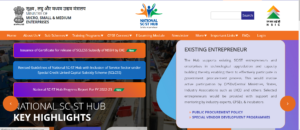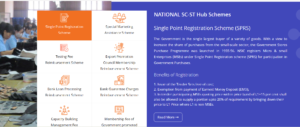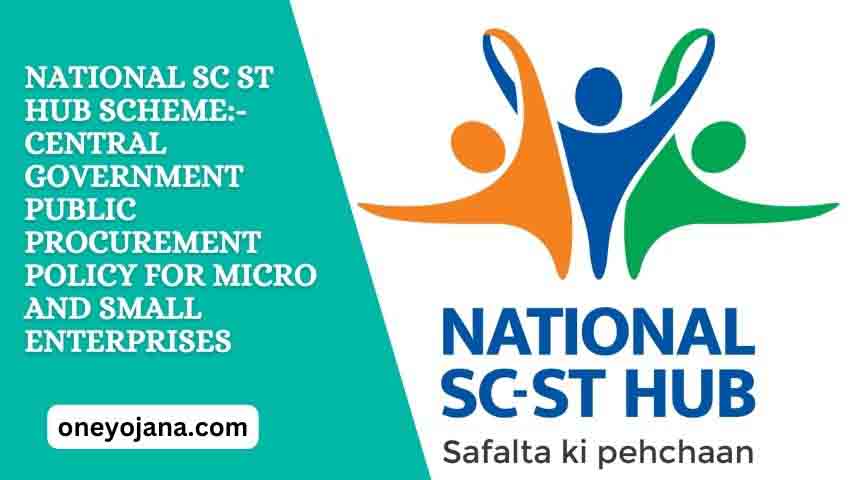The National SC ST Hub has been established to aid Scheduled Caste and Scheduled Tribe entrepreneurs in fulfilling their obligations under the Central Government Public Procurement Policy for Micro and Small Enterprises Order 2012. This initiative aligns with the Stand-Up India program and promotes the implementation of sound corporate practices. This article provides a comprehensive list of the sub-schemes available within the National SC-ST Hub Scheme.
The National SC-ST Hub is being executed by the National Small Industries Corporation (NSIC), a public-sector enterprise under the Ministry’s purview. This initiative is carried out on behalf of the Ministry of Micro, Small and Medium Enterprises (MSME), Government of India. The official inauguration of the National SC-ST Hub for the MSME sector by the Indian government took place in Ludhiana on October 18, 2016.
About National SC ST Hub Scheme 2023
The establishment of a National SC ST Hub aims to assist individuals from Scheduled Caste and Scheduled Tribe (SC ST) backgrounds in establishing their own Micro, Small, and Medium-sized Enterprises (MSMEs). This Hub is dedicated to improving market access, connectivity, monitoring, capacity building, accessing financial support programs, and sharing best practices for SC/ST category entrepreneurs. Furthermore, the Hub will facilitate Central Public Sector (CPS) companies in meeting government procurement objectives. As part of this initiative, nationalized banks will provide loans of up to Rs. 1 crore to SC/ST entrepreneurs, enabling them to achieve self-sufficiency and create job opportunities, especially for young individuals.

Details of the National SC ST Hub Scheme
| Name of the scheme | National SC ST Hub Scheme |
| Initiated by | The Ministry of Micro, Small and Medium Enterprises (MSME) |
| Objective | To help students build their own micro, small, and medium-sized enterprises (MSME) units |
| Beneficiaries | Scheduled Caste and Scheduled Tribe entrepreneurs |
| Official website | https://www.scsthub.in/ |
List of Sub-Programs under the National SC ST Hub Programme
The full list of supporting programmes for the National SC/ST Hub Scheme is shown below:-
Special Credit Linked Capital Subsidy Scheme
The Ministry of Micro, Small and Medium Enterprises (MSME) has initiated the Credit Linked Capital Subsidy Scheme to facilitate technological advancement in Micro and Small Enterprises (MSEs). This scheme offers an upfront capital subsidy of 15% for MSEs, applicable to institutional financing of up to Rs. 1 crore when they adopt established and enhanced technology within the specified 51 sub-sectors/products.
In essence, the primary objective is to enable MSEs to upgrade their plant and machinery with cutting-edge technology, regardless of whether they are expanding their operations or not. This goal extends to new MSEs that have established their facilities using the relevant, eligible, and approved technology in accordance with the scheme’s requirements.
To further support these initiatives, the National SC ST Hub has introduced the Special Credit Linked Capital Subsidy Scheme (SCLCSS), offering a 25% capital subsidy to SC/ST businesses. There is no investment sector, machinery, or technology limitation, and the overall investment limit is set at Rs. 1 crore. The Credit Linked Capital Subsidy Scheme (CLCSS) serves as the model for the implementation process of this scheme.
SPRS, or Single Point Registration Scheme
The government serves as the primary purchaser for a diverse array of products. In the pursuit of enhancing the proportion of procurement from the small-scale sector, the Government Stores Purchase Programme was established during 1955-1956. To engage in government procurement, Micro and Small Enterprises (MSEs) register with the National Small Industries Corporation (NSIC) under the Single Point Registration Scheme (SPRS).
The advantages of registration
The Government of India, Ministry of Micro, Small, and Medium Enterprises, issued the Public Procurement Policy for Micro & Small Enterprises (MSEs) Order 2012, as per the Gazette Notification dated 23.03.2012, with an amendment through order no. S.O. 5670(E) on 9th November 2018. This policy grants certain benefits to units registered under the Single Point Registration Scheme of the National Small Industries Corporation (NSIC).
These benefits include:
- Providing Tender Sets at no cost.
- Exempting MSEs from making Earnest Money Deposits (EMD).
- Allowing participating MSEs in tenders to supply up to 25% of the required quantity by lowering their prices to the level of the lowest (L1) bidder + 15%.
Furthermore, every central ministry, department, and Public Sector Undertaking (PSU) is required to establish an annual target of procuring at least 25% of their total annual goods or services purchased from or provided by MSEs. Within this 25% procurement requirement, 4% is specifically allocated for businesses owned by Scheduled Castes or Scheduled Tribes, and 3% is earmarked for businesses operated by women entrepreneurs. Additionally, 358 additional items are reserved for exclusive purchase from the Small Scale Industry (SSI) sector.
Eligibility National SC ST Hub Scheme
- You can register with the National Small Industries Corporation (NSIC) through its Single Point Registration Scheme (SPRS) if your Micro and Small Business holds an EM Part-II (Optional) or Udyog Aadhaar Memorandum (UAM).
- Micro and Small Businesses that have commenced production for the market but have not yet completed one year of operation are eligible. Once you have paid the registration fee and assembled the necessary documents, Micro and Small Enterprises under the Single Point Registration scheme can obtain a Provisional Registration Certificate. This certificate will carry a monetary limit of Rs. 5.00 Lakhs and is valid for one year from the date of issue.

How to Apply for the National SC ST Hub Scheme
Micro and Small Businesses (MSEs) are required to submit their applications in duplicate. These applications can be submitted either online at www.nsicspronline.com or on the designated form. You should submit your application to the NSIC Zonal/Branch Office or NSSH Office nearest to your unit. In case you encounter any issues during the application process or document collection, please reach out to any NSIC Zonal, Branch, or NSSH office for assistance. The application form, along with terms and conditions, is readily available at all NSIC locations. A comprehensive list of the necessary documents to accompany your application can be found in the instructions provided with the application form.
Registration Fee:
The registration fee for SPRS, including registration, renewal, and any other amendments, is determined based on the Net Sales Turnover reported in Micro & Small Enterprise’s most recent audited balance sheet. However, SC/ST-owned MSEs can register, renew, or make amendments in the SPRS for a nominal fee of Rs. 100 plus GST.
Registration Process
- Micro and Small Businesses should initiate the registration process by submitting their applications. These applications can be submitted in duplicate either online at www.nsicspronline.com or by using the designated application form. Applications, along with the requisite fee and supporting documents, should be sent to the nearest NSIC Zonal/Branch/Sub Branch, Sub Office, or Extension office.
- The Micro & Small Enterprise will dispatch a duplicate copy of the G.P. Registration Application Form, copies of the necessary documents, and the required Proof of Inspection Fees to the relevant Inspection Agency. This step is taken to request a technical inspection of the Micro and small enterprises, and the Inspection Agency will subsequently provide their findings and recommendations.
- Upon receiving the Inspection Report, NSIC will proceed to issue the SPRS Registration Certificate to the Micro and small Enterprises for the products or stores as suggested in the report.
Special Marketing Assistance Scheme (SMAS)
Marketing support to the SC ST enterprises for the enhancement of competitiveness and marketability of their products will be provided by way of the following types of events:
- Organizing Visit to International Exhibitions/Trade Fairs/Seminars Abroad
- Participation in International Exhibitions/Trade Fairs Abroad
- Organizing Visit to Domestic Exhibitions/Trade Fairs
- Participation in Domestic Exhibitions/Trade Fairs
- Vendor Development Programmes
- Organizing Workshops/Seminars/Awareness Campaigns
Features of the Special Marketing Assistance Scheme
Here are the key features of the Special Marketing Assistance Program (SMAS):
-
SC/ST units availing benefits under the scheme must be registered in the MSME Data Bank.
-
Booths or stalls at exhibitions or trade shows should not exceed the size of 3m x 3m.
-
Regardless of the number of units they own, SC/ST business owners can only seek reimbursement under SMAS for a maximum of 2 international events and 4 domestic events per fiscal year. Additionally, one MSE may not be represented by more than one individual during a fiscal year.
-
A minimum of five SC/ST businesses is required for a foreign visit to international exhibitions, trade fairs, or seminars. For participation in international exhibitions/trade fairs overseas, there is no specific unit quota.
-
When five or more SC/ST businesses participate in international events abroad, one NSIC representative may accompany them. In cases where over ten SC/ST businesses participate, consideration may be given to adding one more representative from NSIC or the Ministry of MSME. These officials will receive their duty allowance based on entitlement.
-
For domestic events, SC/ST units must apply to NSSH at least one month in advance, and for international events, the application should be submitted two months in advance, through the field offices of NSIC.
-
Annual goals for the Vendor Development Programme should be established, and MSMEs can participate in achieving these targets.
-
The Screening Committee at NSIC reviews the proposals submitted under SMAS at NSSH, and based on its recommendations, CMD-NSIC may grant approval. In exceptional cases, proposals must be submitted to the Administrative Ministry for approval.
-
SMAS is subject to additional terms and conditions, application forms, documentation requirements, and eligibility criteria outlined in the Ministry of MSME’s International Cooperation Scheme Guidelines, as updated periodically.
-
Under the National SC/ST Hub program, the Ministry of MSME supervises and provides funding for the SMAS program.
National SC ST Hub Scheme FAQ’s
Q: Are there any preferential provisions for Micro and Small Enterprises (MSEs) owned by SC/ST entrepreneurs in public procurement?
A: Yes, there is a sub-goal that allocates 4% of the yearly procurement target of 25% for purchases from MSEs operated by SC/ST business owners.
Q: Which agency is entrusted with the implementation of the National SC-ST Hub?
A: The Ministry of Micro, Small and Medium Enterprises (MSME) is responsible for the oversight of the National Small Industries Corporation (NSIC), a Government of India enterprise, which is the designated agency responsible for implementing the program.
